EXCLUSIVE Interview with Dave Marciano of WICKED TUNA
Mike Vicic - April 1, 2012
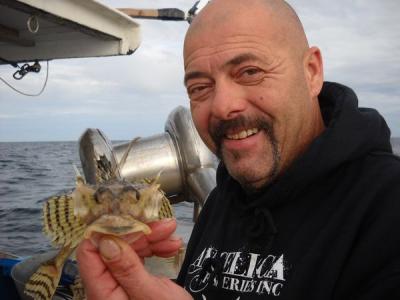
Dave Marciano, the captain of F/V Hard Merchandise on WICKED TUNA, spoke with TV Tango about life on the high seas. Dave shared his secret to being a successful fisherman, relived the day his first boat sank, discussed sustainable fishing and dished about life on a boat.
Tonight, Sunday, April 1, 2012 at 10pm ET/PT, National Geographic Channel presents the world premiere of its new series WICKED TUNA.
|
|
|
|
 |
TV Tango: Have you ever lost a boat? Dave Marciano: Yes, on January 13, 2004 I lost my original boat, the Angelica Joseph. It was named after my kids. We sank about 20 miles at sea on the way home from fishing.
TV Tango: What happened? What caused it? |
|
The season before I had totally refastened the boat. I had put in about 2700 silicon bronze screws. I did all the work myself. I replaced all the butt blocks on the boat; she was a 28-year-old wooden fishing boat.
There were two butt blocks that I could never just access, the way the boat was constructed. The area where I was taking on water was roughly in that area.
The boat sank in 33 minutes from the time my high-water alarms went off. I notified the Coast Guard we were having trouble, and we eventually abandoned ship because she was so full of water.
There was another fishing boat, which by this time was standing by. He was real close to us. I knew as long as we got clear of the vessel -- we didn't get tangled in the gear or get trapped in the boat -- we were going to be alright, but I was going to lose the boat.
We had to put our survival suits on -- cold-water exposure suits. We're required by law to carry those. We deployed our life raft. We were towing it. We kept trying to save the boat. I had four pumps running, all while we were towing the life raft.
That's why I believe it was a butt block that let go, so slowly that the plank just started to peel back more. Eventually, we had a two- or three-foot hole -- who knows -- and the pumps just couldn't keep up with the water.
It was surreal. You know, fishing boats sink all the time, but it was kind of like being in a car accident -- you just never think it's going to be you.
You could hear all my communications with the Coast Guard. When the guys heard I was taking on water, a lot of the local fishermen were listening in about what was going on -- my interactions back and forth with the Coast Guard. They were saying, "You know, you sounded as calm as an air-traffic controller." A lot of them were saying, "If my boat was sinking, I'd be screaming. I'd be freaking out." I think it was all the safety training that we're required to do by the United States Coast Guard that kind of kicked in at that point, you know. |
|
|
|
 |
TV Tango: What happened in 2010 when you sold your federal groundfishing permit? Dave Marciano: I just didn't have the $400,000 necessary to purchase the quota to continue to run my boat for groundfishing. Now, what I do is I run other boats as skipper. As captain, I run four or five different boats throughout the season.
TV Tango: So you run your own boat only for bluefin tuna? |
|
|
 |
TV Tango: What are your biggest challenges when you're fishing for bluefin? Dave Marciano: Staying on the fish. They're quite elusive fish, even when you find some tuna. We know through tagging studies that the fish can travel 100 miles in a 24-hour period. Literally, you can be on them one day, and then go out the next morning and they could be gone. You have no idea -- they could be 100 miles from where you just caught one.
If they want to move, they can move. They've got tails. |
|
It doesn't happen all the time, but it does illustrate the fact that they do move. It's hard to tell, but 10-15 miles might be an average. If we've been working for a week or so on a school of fish, they generally shift to where the bait goes.
If I have a secret in the business, it would be my ability to figure out where the bait fish go. If you can stay on the bait, ultimately you're going to stay on the tuna. Mother Nature takes care of the rest, you know. |
|
|
|
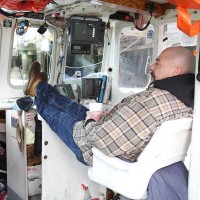 |
TV Tango: Given what you just said, has technology helped you at all during the past few years? Dave Marciano: Not really. We have the "fish finder" on the boat, which is just a machine used to look in the water below the boat. But that doesn't really find the fish. It's up to me to find the fish, that machine just tells me whether I'm right or not.
People have asked me, "What's the most important piece of equipment you have?" Literally, for a guy like me, that sounding machine is comparable to a hammer for a carpenter. Without that sounding machine, I'm blind as to what goes on under the boat. |
|
|
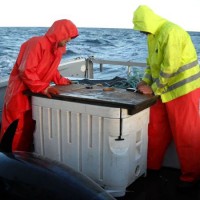 |
TV Tango: What's the weight of the biggest bluefin you've ever pulled in? Dave Marciano: It was probably right around 1200-pounds whole. Dressed out -- with the head, the guts and the tail cut off -- it weighed 852 pounds. It was about 3-3.5 hours to reel that guy in.
How long it takes all depends on the fish. Everyone is unique. Last season, before they were filming, I had two fish when I was fishing alone. I had two 800-lb fish, and both of them were like 5.5-hour fights. There was nobody on the boat but me, and it was quite a grind. |
|
|
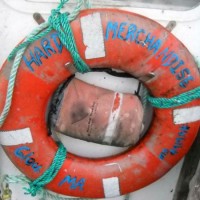 |
TV Tango: What country do you sell most of your tuna to? Dave Marciano: The majority, hopefully, go to Japan. If the fish is high quality -- when I say high quality, I'm talking in reference to the fat content of the fish. For a fish to be desirable for the sushi market, it needs to have high fat content; otherwise, it tends to taste dry to the palate.
On the series you'll see how we grade them. |
|
If we catch a fish that has a low fat content, that will generally stay in the United States as a domestic sale. That will be the really nice red tuna steaks that you might see at your local fish market or some of the bigger chains, behind the glass. Those nice, dark red tuna steaks, those are the giant bluefin tuna.
Slowly over the past few years, people are eating a lot more sushi [in this country]. There is slowly a nice domestic market for sushi developing. It's just not as big. We don't get the big money for the U.S. fish, but if there aren't too much fish around, we can still get $10 or $11 per pound for a domestic tuna on the sushi market. That's pretty good because we don't have to buy the $3,000 plane ticket.
People like sushi in the country, but it's just not as big a market as it is in Japan. But it's getting better all the time. |
|
|
|
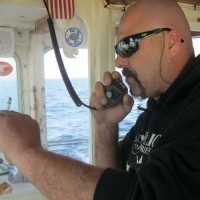 |
TV Tango: How do you deal with confusion when some organizations (like WWF) label bluefin as endangered, while others (like NOAA - National Oceanic and Atmospheric Administration) do not? Dave Marciano: Personally, I generally disagree with the fact that they're an endangered species. Maybe part of that is bias because I do make my living, but I believe we fish sustainably in this country. I think there's a benefit of getting the word out of how we manage fisheries in the United States. After all, I believe that U.S. commercial fishermen are leaders in the world, and we should be the example of other countries to follow to manage their fisheries as conservation-minded as we do here in the United States. |
|
TV Tango: Were you surprised when NOAA said bluefin weren't endangered? Dave Marciano: No. We see it all the time. I do understand they're not as abundant as they were in the past. But just looking at my lifespan -- the 25 years that I've been fishing for these bluefin tuna -- when I was a young guy, there wasn't that many fish around. All I've seen is the stark increase every year, and our quotas have been increased every year. For guys like me, it's the good ol' days. It's better now than it was when I started.
It's a societal issue -- 25 years ago, there was a premise that we could never catch all the fish in the sea. Look back then, and we used to have barges that dumped the trash in the ocean, and all that went on. It wasn't intentionally people trying to destroy things, that was just the attitudes back then. I think collectively, as a society, we all understand that we have to do things a little different. So 25 years ago, there was no regulation. You have to look back at that track record, where you could literally do whatever you want. Now, we're deciding that was the wrong way to do business -- as a group -- and now we're moving forward. We're starting to see those results on a positive level. |
|
|
|
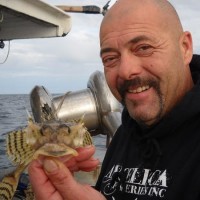 |
TV Tango: Did the Deep Horizon oil spill in 2010 affect your business? Dave Marciano: Not at all. We're totally away from there. We're up fishing in the Gulf of Maine -- thousands of miles away -- but we did have some concerns. Although we do know very little about the exact spawning habits of giant bluefin tuna, they do know that down in the Gulf of Mexico, somewhere these tuna do spawn.
That was a big concern. When the reports came out -- don't quote me on the exactness of the data -- I think I remember they feel it was roughly 10% of the spawning fish may have been affected. It's not great, but at first we thought we were going to lose an entire season of spawning bluefin tuna, which would be devastating. Ten percent isn't a great number, but it's better than losing 100% of the juveniles that spawned. |
|
|
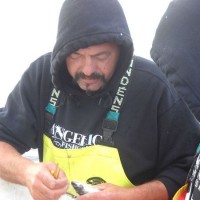 |
TV Tango: In California fishermen recently help save two whales that were entangled in fishing nets. What's your best story about saving marine life? Dave Marciano: I don't really have one. At least over here, and I imagine it's the same over there, but by law -- even if I see a marine mammal tangled in my own gear, which hasn't happened by the way -- we have to notify the Coast Guard. They have people that are trained to get the mammals out of the gear. By law, I can't go near that whale, even if I think it's in trouble, until the proper authorities arrive.
What I can do, and what's kind of suggested -- it's not a downright law -- is that I stand by to keep track of the whale so when the proper authorities get there, they can find it again. If somebody's got to go, we try to get another boat to stand by on scene, just so the authorities can find that animal and release it from the gear. |
|
In fact, I have never personally witnessed a marine mammal tangled in gear. Our fishing gear and technology have come a long way to improve those interactions.
The bottom line is the population of marine mammals -- seals, whales and dolphins -- is expanding as well, as all of our conservation methods get better. So naturally, if the population of those animals is increasing, there's a likelihood that a fisherman is going to have a higher increase of interactions with each mammal.
One thing we've worked with science a lot over the past 10 or 15 years is to develop what's considered to be whale-safe gear with weak links on it so they can break. Again, that was a change. After a hundred years of building your gear to stand up to the rigors of the ocean, then the issue of marine mammal entanglements came into play. We had to design gear.
What we did for the gillnet fisheries, we designed gear with weak links in it. So let's say a whale gets tangled in it, the gear is strong but weak enough that the whale, in theory, can break itself free. |
|
|
|
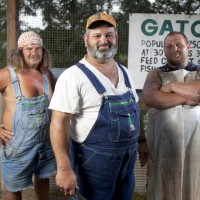 |
TV Tango: What TV shows are on your DVR at home? Dave Marciano: I kind of surf everything. My new favorite, I guess, is SWAMP PEOPLE. I love those dudes with the gators. |
|
|
